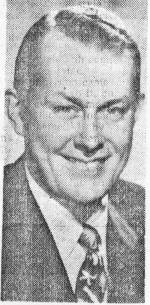Special to the New York Times
STUART, Fla., May
21--Vaughn Monroe, the singer and bandleader of the late nineteen-forties and
early fifties, died tonight at Martin County Memorial Hospital, where he had
undergone surgery two weeks ago. He was 62 (sic) years old.
__________
Headliner of An
Era
By
GLENN FOWLER
 In the era of the big bands, Vaughn Monroe was one of the top singing
bandleaders. He was perhaps best known for his versions of two hit songs:
"Ghost Riders in the Sky" and "Racing with the Moon."
In the era of the big bands, Vaughn Monroe was one of the top singing
bandleaders. He was perhaps best known for his versions of two hit songs:
"Ghost Riders in the Sky" and "Racing with the Moon."
Like several of the other headliners with "name" bands, Mr. Monroe weathered
the advent of rock 'n' roll and other later styles of music by leaving center
stage and forming small bands to play club dates and at weddings and other
private occasions--mostly for the generation that clung to the less energetic
music of the period before the "new sound" become dominant.
As recently as last year, several Vaughn Monroe "units" were playing in
various parts of the country. But the leader himself had been forced to phase
out his own appearances.
A native of Akron, Ohio, he began playing the trumpet in high school and won a
state-wide trumpet contest. He entered Carnegie Institute of Technology in
Pittsburgh with a career as an engineer in view, but after two years he left
college and went with a band. It was 1932, the depths of the Depression, and
young Monroe could earn good money as a trumpeter and singer.
In 1937 he when (sic) with a band headed by Jack Marshard that was well
known in society circles. Marshard son found that his trumpet player and
vocalist--who stood 6 feet 2 inches and had movie star features--was
especially popular with audiences. So Vaughn Monroe was launched as a
bandleader and Jack Marshard became the band's business manager.
By the outbreak of world War II, Mr. Monroe had become nationally known. His
band played lucrative one-night stands, they headlined at stage shows in movie
palaces across the country, and the band was featured on radio.
His success as a showman concealed the fact that his voice was--as his
greatest fans were forced to admit--not very good. Frequently off key and
quite nasal, his tones nevertheless were adequate to augment his warm manner
and handsome appearance sufficiently to captivate audiences.
At the peak of his career, Mr. Monroe issued hit record after hit record,
"There, I've Said It Again," "Ballerina," "Mule Train," and dozens of others.
Started Radio
Show
In 1945, Mr. Monroe began his own "Camel Caravan" radio show. His vocal style
had become at once immensely popular and widely ridiculed--but he shrewdly
concluded that the imitations of his singing by radio and nightclub comics was
spreading his fame.
When television came in, Mr. Monroe adapted to it, but after the first few
years most of the big bands like his found themselves superseded by newer
forms of entertainment.
Mr. Monroe also was featured in some films, but Hollywood never claimed him as
it did several of his contemporary bandleaders.
He is survived by his widow and two daughters.